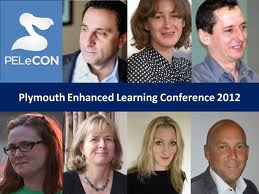PELeCON is the Plymouth Enhanced Learning Conference #pelc12 @PeleCON. I have just returned home from attending it for the first time and would like to share my experience of how I came to be at PELeCON, what I learnt from it and how much fun it was to be there.
Fairly and squarely I have Twitter to thank. Just over a year ago, through either random or astute following, I discovered Steve Wheeler @timbuckteeth whose tweets opened up mind-blowing access to resources, current information and a network of people interested in Web 2.0 technologies and digital literacies. This was in tandem with Jane Hart from the Centre for Learning and Performance Technologies @C4LPT and her advocacy of Twitter as a tool for professional development. So how lucky was it for me that these two forces came together at PELeCON 2012.
The conference theme, importantly for me, was create, connect and collaborate with digital literacy and literacies presenting a strong influence on the programme. It was this call to connect and the role of digital literacies that greatly resonated with me during the conference. For me digital literacies are not simply skills or the competent use of technologies but social practices embedded in contexts that carry meaning for those involved. This was brilliantly highlighted by David Mitchell @DeputyMitchell who spoke about the impact that blogging has had in his school, transforming reluctant or ambivalent classroom writers into enthusiastic bloggers. The reason for this, one insightful and honest pupil explained to him, was the he, the teacher, "wasn't real". They wanted to write with purpose for a real audience. In matters of literacy, it must be acknowledged that power, access and identity are ever present considerations.
The desire to connect with a real audience, I feel, chimes with sentiments expressed by Alec Couros @courosa in the conference's closing panel discussion. He sees the central challenge to learning as being "the movement of education to life".
The call for improved connection was also made by Nick Laycock @alc47 and associates in a panel discussion looking at the disconnect between learning and the workplace. This was re-inforced by Jane Hart's keynote, which highlighted the learning practices that smart autonomous learners/workers are increasingly turning to.
Connection amongst delegates was a key feature of the conference as plenty of time and space was made for networking. Here I must thank Catherine Cronin @catherinecronin and Sharon Flynn @sharonlflynn, my travelling companions, who helped with introductions allowing me to settle in to the PELeCON swing and make connections of my own.
Useful Websites:
David Mitchell's keynote - http://prezi.com/stshpctwm3ag/pelecon-keynote/
David Mitchell's keynote - http://prezi.com/stshpctwm3ag/pelecon-keynote/
QuadBlogging _ a leg up to an audience for your class/school blog. http://quadblogging.net/

